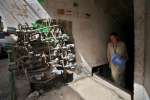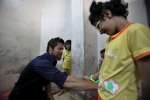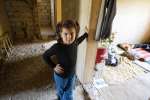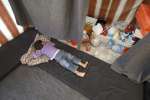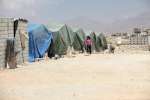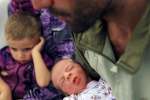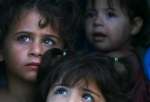Syrian refugees in Jordan, Lebanon snared in poverty - study
News Stories, 16 December 2015
AMMAN, Jordan Dec 16 (UNHCR) – Syrian refugees in Jordan and Lebanon are facing dire levels of poverty, with the situation expected to worsen in the near future, a study published today by the World Bank Group and the UN Refugee Agency revealed.
Nearly 1.7 million Syrian refugees registered in Jordan and Lebanon live in miserable conditions, often unable to afford the very basics including sufficient food, clothes and medicine. The majority are women and children who live on the margins in urban and rural areas, often in substandard accommodation, rather than in refugee camps.
In Jordan alone, nine out of every ten registered refugees are either already defined as poor or soon will be, the report found.
The majority of these were assessed as being highly vulnerable to monetary and food shocks, such as when the World Food Programme was forced earlier this year to temporarily reduce or suspend food assistance to hundreds of thousands of refugees due to funding shortages.
"This report presents a sobering analysis of the profound poverty of Syrian refugees who have endured shock after shock. Their situation will only worsen unless there is a dramatic change in opportunity for them to support their own self-reliance and contribute to local economies," said Kelly T. Clements, United Nations Deputy High Commissioner for Refugees.
Among those struggling with poverty is Yusra, a 45-year-old single mother from Homs. She came to Amman in March 2014 with her three children and the equivalent of US$5 in her pocket, their resources having already been depleted after three years of internal displacement within Syria to escape the fighting.
"Me and my two sons are still wearing the same clothes we came to Jordan in," she told visitors from UNHCR. Barely able to meet the 100 Jordanian Dinar (US$140) rent on their tiny two-room apartment each month, she and her eldest son regularly skip meals to ensure her 10-year-old daughter and other son, who has a mental disability, have enough to eat.
"I'm trying my hardest to be strong and keep our family together – that's all I can do," Yusra said. They rely on the 3 to 4 Dinars (US$4-6) that her eldest son Gizwan, 26, earns each day from his informal job in a fruit and vegetable shop an hour's walk away from their home. She says she hopes all Syrians will eventually be allowed to work legally "to try to improve their own lives".
The study highlights the importance but also the limitations of humanitarian assistance programmes, and calls for greater economic inclusion of refugees in host countries as part of overall efforts to mitigate the crisis. Whereas funding limitations mean that short-term cash and food assistance programmes – while effective – benefit only the most vulnerable, longer-term inclusion policies would benefit all refugees as well as the communities hosting them, the report found.
With children accounting for around half of all Syrian refugees, the report also warns that the inadequate quality and availability of education threatens to undermine their future development prospects. In Jordan, only about half of school-aged refugee children are currently enrolled in public education.
Abu Feisal is a 35-year-old former elementary school teacher from the Ghouta suburb of Damascus, now living with his family in a tent on the outskirts of the northern Jordanian city of Mafraq. Neither of his two school-aged children are currently receiving an education.
"My kids used to love going to school, but the local school here has no spaces and I can't afford the bus fare to send them into the city every day," he said. "We just spend our days trying to find enough to eat, and the longer we are here the harder it gets. We are just being ground down over time."
By Charlie Dunmore in Amman, Jordan
The study "The Welfare of Syrian Refugees: Evidence from Jordan and Lebanon" is available here.





